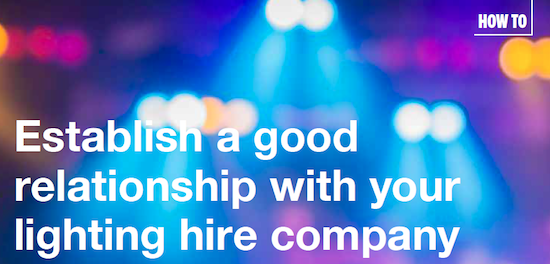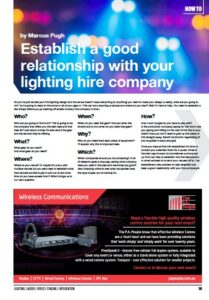News
17 Aug 2018
How to establish a good relationship with your lighting hire company

Subscribe to CX E-News
How To
Establish a good relationship with your lighting hire company
By Marcus Pugh.
So you’ve just landed your first lighting design and the venue doesn’t have everything (or anything) you need to make your design a reality, what are you going to do? You’re going to need to hire some or all of your gear in. This can be a daunting proposal and where do you start? Well I’m here to help. You need to establish a few things before you go bashing off emails to every hire company in town.
Who?
Who are you going to hire from? This is going to be the company that offers you the best deal and that deal isn’t just about money it’s also about the gear and the service they’re offering.
What?
What gear do you want? And what gear do you need?
Where?
Where is your venue? Or maybe it’s a tour with multiple venues but you also need to establish what that venue/s are like to get in and out of and what time do you have access from? Which brings us to our next question.
When?
When do you need the gear? Not just when the show/s are on but when do you need that gear?
Why?
Why do you need/want each piece of equipment? I’ll explain why this is important later.
Which?
Which companies should you be contacting? A bit of research goes a long way; asking what company have you used in the past and were they any good? Also checking online to see what companies have the type of gear you’re looking for.
How?
How much budget do you have to play with? Is the production company paying for the hire or are you paying and billing on the cost of the hire to your client? Now you don’t need to give up this piece of info straight away, there’ll be time for negotiating (if you’ve gotten in early enough).
Once you have all this info established it’s time to contact your potential hirers for a quote. Email is the best way forward but sometimes a phone call up front can help to establish who the best person or email address is to send your request off to. I’ve established a few pointers to help establish and keep a good relationship with your hire company/s.
1. Plan ahead
Get your equipment ‘wish list’ into the hire company as early as possible, even if your design or show hasn’t fully been realised yet. Most times you will know weeks out what the main pieces of gear needed or the overall look that the show will require. Nothing pointlessly soaks up more budget than someone trying desperately to pull together a show at the last minute. It erodes discount and good will if the hire company has to rush around to get the equipment ready for a disorganised client.
2. Be flexible
While I know that everyone hates to read that section of the quotation titled ‘Substitutions’, there are reasons that most every quote will contain it. Either the company doesn’t have the piece of requested equipment available or your budget won’t cover the requested pieces of equipment. Take these substitutions into consideration and don’t just write them off as “This isn’t what I asked for!” These substitutions, if acceptable, can be a good bargaining tool in the negotiation process. But more about that later.
3. Ask for and Take the Advice
Just because hire companies don’t always come off as the friendliest lot, this doesn’t mean they aren’t trying to help you achieve the best possible show. If the first quote based on your ‘wish list’ is out of your budget, don’t hesitate in asking what equipment might be available that could achieve a similar effect. You should be able to prioritise your elements; for example, the beam angle or colour mix might be more important than the number of gobos or shaping shutters on a fixture, or can you compromise on your back light fixtures for a better quality front light fixture? A few small compromises which a hire manager will usually suggest could save you a bucket-load when it comes to final bottom line cost of a production.
4. Communicate well
The key to any good relationship is good communication and honesty. Taking a bit of extra time to make sure you’ve explained the list or the times and dates correctly can save you a lot of confusion in the long run. Don’t be afraid to give your contact at the hire company a loose budget figure and you’ll find that most companies will prefer this because it helps in the quoting process and spec’ing the right equipment.
Communication is a two-way street, remember to always read the terms and conditions of the hire especially when it comes to payment terms; nothing sends a relationship sour like someone who doesn’t pay within the agreed timeframe. Chances are on any complex production you are going to need to communicate with your hire company multiple times – compile your changes and questions and send them in one hit. This helps to save the hire company time which brings us nicely to number 5.
5. Time and resources equal money
Just like any other business hire companies have overheads to cover and if you’re willing to elevate some of these overheads, like transport, this will help with the overall cost of the hire. If you are able to help reduce the prep or return costs by ensuring that the gear is clean and cables are rolled may also help your overall hire figure on this and the next hire. Wherever possible pick-up and drop off the equipment yourself. This also helps to establish a face-to-face relationship with your contact at the hire company.
6. Do you research
We all have the amazing research tool of the internet at our fingertips. It is good to know which brands or particular models of equipment your hire company carries because this assists in tailoring your gear list to get a better price. If you’ve done your research you should also be aware of what alternatives might be available and suitable in your particular market place.
7. The latest technology isn’t the best thing for your budget
While all of us love to have the latest and greatest piece of equipment to play with in our rig. These are usually going to attract higher hire cost too. This is due to demand and the cost of purchases associated with being an early adopter. In most cases you will find an industry ‘workhorse’ in all categories of equipment and chances are that most companies will have this ‘workhorse’ in greater numbers. Through supply and demand this will mean that the ‘workhorse’ can be priced more competitively.
8. Don’t be afraid to negotiate
The first price may not be the best price, so don’t be afraid to go back to your hire company to ask for better price or where substitutions could be made to better suit the budget. While there is an art to negotiation don’t play games because no one likes having their time wasted. You are looking to establish a good ongoing relationship, not just to get a great deal on one job to the detriment of future work.
9. Bring it back the way you got it
Nobody likes to lose stuff, least of all hire companies. Keep track of your cables and those small accessories like power connectors and rigging pins. If you’re not exactly sure of what you hired, request a full list, which will usually be provided.
If necessary contact the hire manager and request a list of what you have on hire before the load out (they will respect the forethought). Another important note is damage to equipment; treat the gear like it’s your own. If damage does occur (and we all know it’s inevitable in our industry) own up to it and let the hire company know, this can be as simple as marking up damaged units or the case they’re in with some tape or making a phone call or email to let them know before the gear gets back. If you think they won’t notice the damage you’re wrong.
10. Establish a good ongoing relationship
While all the points I’ve made here will help to establish a good relationship, if you are able to keep the relationship positive it will mean the next time you need equipment you will get an equal or better discount. If you’ve had a better than average experience with your hire company don’t hesitate to mention it in an email, or drop off a slab of brews or a bottle of plonk when you return the equipment, you will find that the money you spend on the beer, spirit, or wine will be far outweighed by the advantages of maintaining a good relationship.
Remember your contact at the hire company is the gatekeeper to the gear you want. At the end of the day your hire company wants your show to look and sound good, as it reflects well on them too.
This article first appeared in CX Magazine August 2018 – print and online. CX Magazine is Australia and New Zealand’s only publication dedicated to entertainment technology news and issues. Read all editions for free or search our archive www.cxnetwork.com.au
© CX Media
Subscribe
Published monthly since 1991, our famous AV industry magazine is free for download or pay for print. Subscribers also receive CX News, our free weekly email with the latest industry news and jobs.







